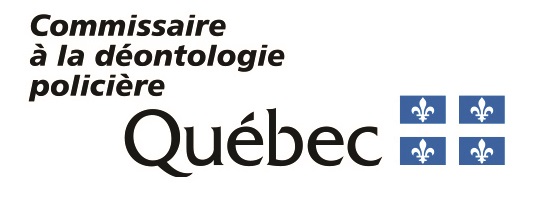File a complaint
Preliminary Analysis
Preliminary Analysis
Here is how the preliminary analysis of a complaint takes place :
1. Register the Complaint
As soon as we receive a complaint, we register it.
2. Acknowledge Receipt of the Complaint
Within 5 days of receiving a complaint, we send a notice of receipt to the person who made the complaint. A copy of the complaint and the evidence provided by the complainant will also be forwarded to the employer of the person concerned by the complaint if the latter is subject to the Code of ethics of Quebec police officers.
3. Carry Out the Preliminary Analysis of the Complaint
We carry out this analysis by creating a file containing the information necessary to direct the complaint appropriately. This file contains, among other things, the information and details communicated to us by the complainant, as well as the police and legal documents available.
It is likely that we will need to ask additional questions to the complainant in order to be able to direct the complaint. If so, we will contact them by email or mail. This person will be able to respond to us by email, online form or paper form.
4. Direct the Complaint
Based on the information gathered, we decide either:
- forward the complaint to conciliation;
- order an investigation;
- to reject the complaint.
Additionally, if it appears that a criminal offense may have been committed, we will immediately forward the file to the appropriate law enforcement agency for criminal investigation.
5. Communicate the Decision to the People Involved
The complainant, the persons targeted by the complaint and their employer are informed in writing of the Commissioner's decision.
The persons targeted by the complaint are notified in writing of the subject of the complaint and of the facts allowing the event that gave rise to the complaint to be identified.
If the Commissioner makes a decision to refuse the complaint, this decision is justified and rendered in writing.
The main reasons for refusing the complaint are:
- The complainant does not cooperate in the preliminary analysis to a request made by us (e.g.: to respond to requests for clarifications essential to the processing of this complaint).
- The complainant was not able to specify the actions, the inactions, the derogatory comments and in what context they occurred (e.g.: simply stating that the police officer was arrogant or that a peace officer discriminated against them without explaining further).
- The complainant is dissatisfied with an intervention or an investigation when the choice of means and/or the conclusions of the police officers or other peace officers were justified (e.g.: complaining about a police officer for asking them to identify themselves when it was legally justified to do so in the context described).
- The complainant asserts that a ticket issued to them was not justified, whereas they must challenge it before the courts.
- The complainant reports gestures and remarks that are not serious enough to constitute a breach of ethics (e.g.: complaining about a police officer only because they spoke to them or because they didn't say "Thank You" when the remaining intervention was respectful).
If they do not agree with the decision taken, the complainant can then ask us to have this decision reviewed. They must apply within 15 days of receiving the decision by submitting new facts or elements. The final decision is then rendered by the Commissioner within 10 days.
Communication with Involved Parties >>
File a complaint
Need help?
If you want more information or if you need help drafting your complaint, you can contact us.
deontologie-policiere.quebec@msp.gouv.qc.ca
